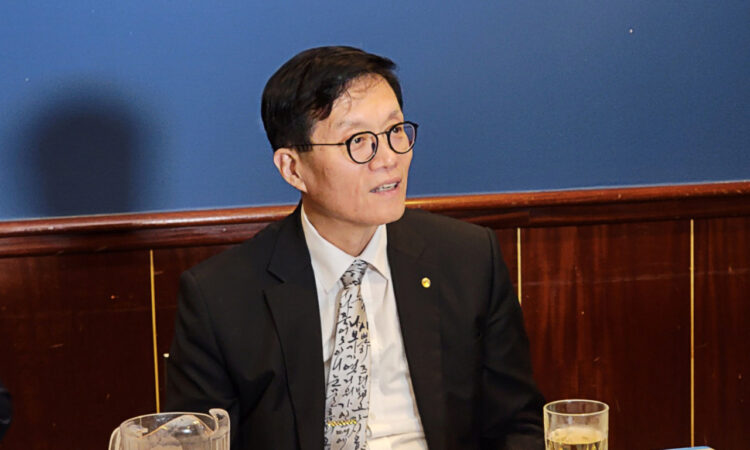
Bank of Korea Governor Rhee Chang-yong, during his visit to the United States, projected the volatility of the won-dollar exchange rate would ease if the Middle East tension did not escalate further.
“Asian currencies, including that of Korea, have weakened following Iran’s attack on Israel and recent readings indicating a push back in US’ rate cut,” Rhee said in a press conference held in Washington on Friday. The event was held on the sidelines of the International Monetary Fund and Group of 20 finance leaders’ spring meetings.
“The exchange rate has begun to stabilize after we have reached a consensus on the excessive depreciation of the won with Japan and sharing of the consensus through trilateral talks held by Korea, the US and Japan,” he said referring to the three-way talks held by top finance chiefs of the three nations on Wednesday.
Furthermore, the local forex authorities have conducted “verbal interventions” to stave off further fluctuations in the won-dollar exchange rate in recent days.
“If the war does not further expand, there will not be difficulties in managing the exchange rate,” Rhee said, explaining the rate will stabilize if incidents such as the shutdown of the Strait of Hormuz do not occur.
“We are seeing the economic growth or inflation path to move in a projected trajectory, but it is yet to make judgments,” Rhee added.
The won has lost its strength against the dollar recently with the anticipation that the US Federal Reserve will continue its aggressive monetary tightening due to the hotter-than-expected inflation readings in the US economy.
The strong safe-haven demand for the US dollar evoked by the Iran-Israel conflict also fueled the devaluation of the Korean won.
The won-dollar exchange rate closed at 1,382.2 won on Friday, marking an over 7 percent devaluation of the won in nearly four months compared to how the rate stood in the 1,280 won range in late December. The won even reached its lowest at 1,400 won against the greenback on Tuesday,
The surge is the sharpest since 1990, when the market average exchange rate system was introduced here, meaning the rate was settled by transactions between market players, contrary to how it was announced by the government previously.
In the same periods of 2008 and 2009, when Korea was impacted by the global financial crisis, the rate surged by 6.9 percent and 5.8 percent respectively. The rate also increased by around 6 percent in the first four months of 1997 when Korea was going through financial difficulties.
Though the volatility in the exchange rate is caused mainly by the strong dollar, the depreciation of the Korean won is also a factor.
The US dollar index, a metric of the dollar value against major six peers such as the euro, pound and yen, rose 4.9 percent this year, outweighing the 7.3 percent devaluation of the won against the dollar. The figures show the Korean won has lost its own value.
Gov. Rhee had explained the won’s devaluation partly results from the depreciation of the Chinese yuan and Japanese yen, as the won works as a proxy for the two currencies.
“The upper band of the won-dollar exchange rate has been confirmed. The rate reached its peak at 1,400 won, as Korea, the US and Japan engaged in policy cooperation,” Daishin Securities Economist Lee Joo-won viewed.
“If the Iran-Israel conflict does not expand, the inflationary pressure will weaken in the second half of this year,” Lee said. “The eased uncertainty of (the US Fed’s) monetary policy will contribute to the transition of the dollar-won exchange rate.”



